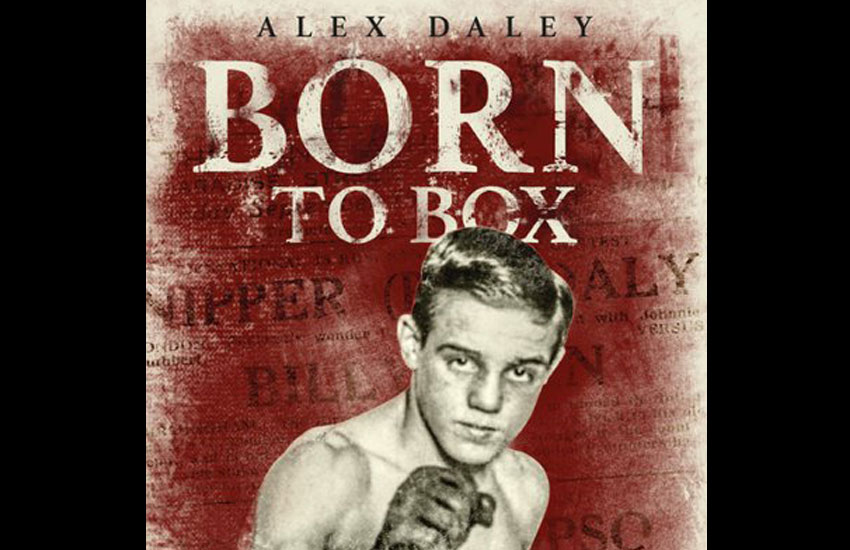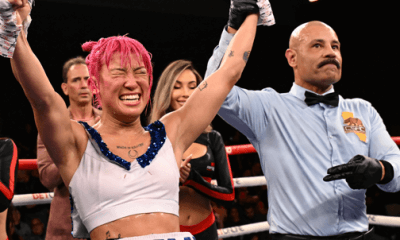Canada and USA
Literary Notes: “Born to Box” – Book Review by Thomas Hauser
A word of explanation regarding the process by which I review books.
Each year, I’m sent dozens of books about boxing. I don’t have time to read all of them in their entirety, but I read at least part of each book

A word of explanation regarding the process by which I review books.
Each year, I’m sent dozens of books about boxing. I don’t have time to read all of them in their entirety, but I read at least part of each book. Some of them are informative, beautifully written, and demand attention. I read these books from cover to cover. Others don’t rise to that level but are solid research efforts. And some are mediocre.
I write for a living, so I’m sensitive to the time and effort that go into writing a book. I know that a good review can move the needle a bit, particularly for authors who receive little marketing support from their publisher or self-publish. But I also have an obligation to readers who rely on my reviews in deciding which books to buy and read.
In recent years, Pitch Publishing has published more than it’s share of books about the sweet science. Born to Box by Alex Daley – a sad story of what might have been versus what was – is its latest offering.
Pat Daley removed the “e” from the spelling of his last name and fought as “Nipper Pat Daly.” The story of his life has been written by his grandson. That raises a red flag with regard to objectivity, but it’s a credible book.
Daly was born in Wales on February 17, 1913. He entered the ring for his first pro fight seven weeks before his tenth birthday. By his mid-teens, he was hailed by the British press as a boy wonder, the future of British boxing, and a worthy successor to flyweight great Jimmy Wilde. At age 16, he was ranked among the top-ten bantamweights in the world by The Ring. He was, his grandson writes, “handing out boxing lessons to grown men in 15-round fights, trouncing pros with whom, by any logic, he had no business sharing a ring.”
Want more?
In 1927, at age 14, Daly fought four 15-round fights against grown men in the course of 38 days, winning three and battling to a draw in the fourth.
In 1928, he fought 25 fights totaling 280 rounds.
In 1929, when Daly was 16, these numbers increased to 33 fights and 319 rounds. That same year, the British publication, Boxing, proclaimed, “We may hope with increasing confidence to see the day when he is acknowledged as absolutely the best and greatest there has ever been.”
“It was becoming increasingly hard to believe,” Alex Daley writes. “Hard to believe that a boxer could be so good at such a young age, and harder still to believe that he could keep on going fifteen rounds week after week against grown men yet each time emerge unscathed. So far, Pat’s toughness, fitness, speed, and skill had made a mockery of age and strength disadvantages.”
But the seeds of Daly’s destruction were being sown. His handsome young face had been marred a cauliflower ear from age 14. Scars and other visible reminders of his trade began to accumulate.
The worst damage was unseen.
“Pat was aware of the dangers of fighting so often and at the level he was,” Daley notes. “But his immense self-belief, the illusion of invincibility that comes with youth, and a reluctance to let down others would have helped him to purge such thoughts from his mind. What he needed was a wise and compassionate guiding figure who valued his health above short-term financial gain. Sadly, there was no one close to him who fitted this mold.”
Manager-trainer Andrew Newton (who fancied being called “Professor Newton”) cashed in on his prodigy as early and often as possible. He exploited Daly financially and did his best to cut off any avenue that might lead to the fighter’s education or independence.
On June 13, 1929, Daly was knocked unconscious in the first round of a fight in Sunderland, England. Five days later, he fought 15 rounds in Liverpool. He was in the ring again eight days after that. This led the Daily Mirror to warn, “It looks as though Nipper Pat Daly is running the risk of having his career ruined before he has reached his best by being rushed along at too great a pace. His advisers ought to bear in mind the fact that he is not strong enough to oppose boxers who are fully matured and exceptionally strong for the weight.”
On October 9, 1929, Daly suffered another knockout defeat, and Trevor Wignall of the Daily Express wrote, “The whole thing was a tragedy for this child of boxing. He has been worked too hard, his jaw has been made glassy and vulnerable to one accurate smack, and a very promising career has been blighted. He should now be given a long rest and be allowed to grow in a normal way. If this is not done, his life as a fighter will end long before he is twenty.”
Faced with this criticism, Newton responded, “Burned out? Wait for another few years and then see whether any intelligent boy can get burned out so long as I train and manage him. Some boys may get burned out. But if they were, it was only because their trainers did not know their business.”
However, contrary to Newton’s self-justification, Daly was all used up as a fighter at an age when most young men are just starting their ring career.
“He’d seemed destined to rule the boxing world,” Alex Daley writes. “But now, at age 17, he felt like he was on boxing’s scrapheap. Surely, that was absurd. The scrapheap was for washed-up old pugs who had gone on too long, and the old fighter was the only one who didn’t know it. You couldn’t be washed up at 17, could you?”
Daly’s 118th and final fight was contested on January 27, 1931, three weeks before his eighteenth birthday. Boxrec lists his professional ring record as 99 wins, 11 losses, and 8 draws with 26 knockouts and 7 KOs by.
Daly rarely complained about his lot in life. But in 1949, at age 36, he told Ron Oliver of The People newspaper, “I loved to fight. I used to say to myself, ‘If I can do this at sixteen, what shall I be able to do when I’m 26?’ But they never allowed me to grow up naturally.”
Thereafter, the story grew sadder. In his later years, Daley was given to mood swings and erratic behavior and suffered from dementia. His final years were spent in an assisted living facility. He died on September 25, 1988.
In an introduction to Born to Box, Alex Daley writes, “To my regret, I never really knew my grandfather. He died just before my eighth birthday. I have [only] hazy memories of him.”
But drawing on a manuscript written by his grandfather in the late-1970s and his own independent research, Daley has fashioned a moving cautionary tale.
Born to Box is repetitious at times with a recounting of too many fights. But the writing is evocative. And a 1985 observation from boxing writer O.F. Snelling is used to sum up well:
“The boy was so potentially great, so keen and gifted, that with judicious handling it is no exaggeration to say that he might have boxed his way to a world championship had he been allowed to reach his full growth and potential. But he went up like a rocket, burst into sparks well before he had reached his peak, and sank into darkness. A great memory now, but that is all.”
Thomas Hauser can be reached by email at thauser@rcn.com. His most recent book — There Will Always Be Boxing — was published by the University of Arkansas Press. In 2004, the Boxing Writers Association of America honored Hauser with the Nat Fleischer Award for career excellence in boxing journalism.
Check out more boxing news on video at The Boxing Channel
-

 Featured Articles4 weeks ago
Featured Articles4 weeks agoThe Hauser Report: Zayas-Garcia, Pacquiao, Usyk, and the NYSAC
-

 Featured Articles3 weeks ago
Featured Articles3 weeks agoOscar Duarte and Regis Prograis Prevail on an Action-Packed Fight Card in Chicago
-

 Featured Articles2 weeks ago
Featured Articles2 weeks agoThe Hauser Report: Cinematic and Literary Notes
-

 Book Review2 weeks ago
Book Review2 weeks agoMark Kriegel’s New Book About Mike Tyson is a Must-Read
-

 Featured Articles4 weeks ago
Featured Articles4 weeks agoRemembering Dwight Muhammad Qawi (1953-2025) and his Triumphant Return to Prison
-

 Featured Articles7 days ago
Featured Articles7 days agoMoses Itauma Continues his Rapid Rise; Steamrolls Dillian Whyte in Riyadh
-

 Featured Articles3 weeks ago
Featured Articles3 weeks agoRahaman Ali (1943-2025)
-

 Featured Articles3 weeks ago
Featured Articles3 weeks agoTop Rank Boxing is in Limbo, but that Hasn’t Benched Robert Garcia’s Up-and-Comers


















